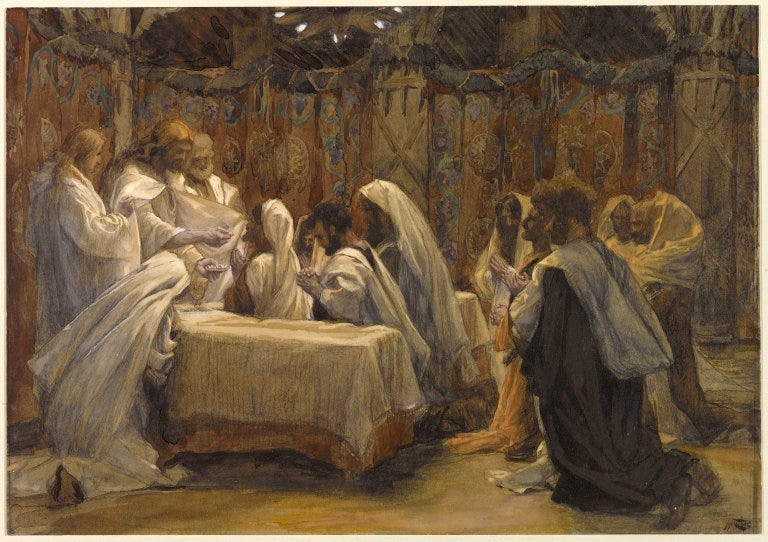When authors of epics name their heroes, it is typical for each to be accompanied by a descriptive epithet, describing their virtues or, as it may happen, their lack thereof: Homer writes of the swift-footed Achilles and Virgil of the pious Aeneus. Within a culture, an epithet can be so strong that it can replace the name altogether. Aquinas called Aristotle the Philosopher. Shakespeare is known as the Bard, Elvis the King, and Springsteen the Boss.
Writing in the context of a Gospel, we might expect Saint Matthew to assign an epithet to the Twelve Christ called forth from his disciples to be Apostles. Matthew perhaps could have written of Peter the Peacemaker, Thomas the Meek, or John the Pure of Heart. Instead, Matthew refers only to their meager families of origin, to his own notorious past as a tax collector, and to Judas’ infamy as the betrayer. It is noteworthy what Matthew does and does not say about the Apostles. He does not praise their merits, extoll their glory, or in any way put them on a pedestal for us to hold in high esteem. Rather, he writes of their humanity—ordinary and unremarkable.
Matthew’s point in writing of his friends in this way is not for us to think little of them. By the time he put quill to parchment, some had likely already won the martyr’s crown, and all were witnesses to the mighty deeds the Apostles did everywhere they went. With this perspective, Matthew certainly could have painted the heroes of Christ’s kingdom in another light. Instead, Matthew introduces the Apostles to us in the condition in which they were introduced to Christ: not right out of the gate as great preachers and evangelists, healers and wonder-workers, but as an unimpressive bunch, sons of nobody important, and with not a lot to bring to the table, if anything at all. Beginning where he does, Matthew can, in the next breath, show what the Lord Jesus can do with their poverty: that he can take the little they have and are, make them anew, and pour into them the power of his Spirit to do the very works the Father sent him into the world to do: curing the sick, raising the dead, cleansing lepers, driving out demons, and all the rest. And this is Matthew's point: what the Apostles do in the name of Christ, they do because of Christ and not because of themselves. Christ works in them and through them—totally. Without him, they can do nothing.
Here is one way in which our corporate mentality doesn’t work at all with the Gospel and, in fact, runs counter to it: Anyone looking to hire someone looks for the most qualified candidate, with the right education, experience, and skills for the job. On the other side, anyone looking for a job presents themselves as the best possible candidate for the position who has what it takes. This is the way the world works—and there’s nothing wrong with that; however, we should be aware of how the realities of life can be transposed onto our fundamental understanding of who we are and how we relate to God. God is not looking for anything in us. God is not weighing out our talents against our imperfections and then figuring in which department we might best serve his kingdom. Nor do we, on our part, do not need to prove ourselves before God or make ourselves appealing to him for him to take notice of us. We might assign any number of epithets to ourselves, but these do not matter to God. Rather, Saint Paul emphasizes dramatically this morning that God chose us and sent his Son to die for us while we were still helpless, while we were ungodly, still sinners, and his enemies. In this, Paul says, God proves his love for us—a love that does not love what is loveable but loves that which any other love would hate.
It is not unreasonable for that kind of love to be difficult to understand. It is the very mystery of God’s mercy—of why he created, redeemed, and chooses at each moment to love us who still remain sinners and his enemies. There is no explanation other than simply because God wills it. God is love. All that he does is love. All that he gives is love. And all he wants from us in return is love.
Love is the mystery at the heart of the world and in the depths of our lives. We would do well, and perhaps could do no better, to contemplate the reality of our poverty and of God’s loving generosity each and every day. Think of the Apostles who were nothing before Christ and who they became after. Think of the saints down the ages for whom Christ did the same. Can it not also be true of us? Certainly.
Matthew did not give the Apostles epithets, but the Church does. We call them saints because that is the only description that matters. The saint is one who has been completely transformed by Christ into a new creation and sings forever in praise of the love of God. And, though sinners, it is our destiny to become saints ourselves. But that can only be reached if we dial back whatever we think of ourselves and seek after only the love of God who makes us who we are meant to be.
Homily preached June 17/18, 2023 at the Cathedral of Mary Our Queen




